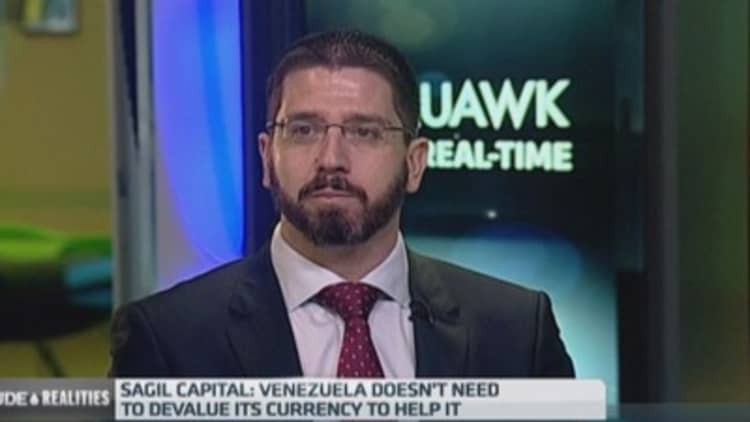
Weak demand and oversupply in oil markets raise the risk of global social instability and the potential for financial defaults, the International Energy Agency (IEA) warned on Friday, as it cut its forecasts for global oil demand growth in 2015.
The report came as oil prices slid to new multi-year lows, with Brent crude hitting a 5-½ -year low of $63.33 a barrel on Friday.
"Continued price declines would for some countries and companies make an already difficult situation even worse," the IEA said in its new monthly report.
Global oil inventories are projected to build by around 300 million barrels in the first half of 2015 in the absence of any disruption, the group said. It estimated that stocks in major global economies could start to "bump" against storage capacity limits.
"The resulting downward price pressure would raise the risk of social instability or financial difficulties if producers found it difficult to pay back debt," it said.
Russia, Venezuela singled out
Singling out Russia and Venezuela, the Paris-based energy think tank said that further price drops would heighten the financial risks to "highly leveraged" producers, and countries that are heavily dependent on oil revenues.
Read MoreOil set to fall further in 'new chapter' for markets: IEA
It warned on the threat to international financial stability should the situation in Russia deteriorate to the point of a default. Bond yields and the cost of insuring Russia against a default have risen in recent weeks amid fears over falling oil prices and intensifying sanctions from the West. Oil – the country's biggest export - is crucial for its economy, and influence in the world.
"Lower oil prices significantly dent potential export revenues in net oil‐exporting countries, slashing their income streams and in turn denting demand," it said.
"In particularly cash‐strapped economies, such as Venezuela and Russia, this impact is likely to be magnified as the risk of default escalates," it said, adding that Venezuela's capital Caracas was currently struggling to make bond payments, fund social programs and pay debts to oil partners.
Venezuela needs to fill a capital shortfall of around $29 billion next year, according to Bradford Jones, a portfolio manager at an emerging markets focused hedge fund called Sagil Capital. He told CNBC Friday that the country was facing a number of very tough decisions and believed a currency devaluation would not do much to alleviate the pain.
"This is a country really facing a perfect storm," he said.
Read MoreOil pressure could sock it to stocks
'More modest' demand growth
Brent crude's losses for the week now stand at more than 8 percent and it has seen a 45 percent fall since peaking near $115 a barrel in mid-June. U.S. crude fell below $60 a barrel on Thursday for the first time in five years, and WTI futures for January traded at $59.23 a barrel at 8:00 a.m. GMT Friday morning.
Weak demand, a strong dollar and booming U.S. oil production have been cited as the main reasons behind the dramatic fall in oil prices, and the IEA has previously called it a "new chapter" in the history of oil markets.
OPEC (Organization of Petroleum-Exporting Countries), a group of 12 major oil producers, decided not to cut production at its meeting in November, further fueling sliding prices, which have shaken stock markets and raised volatility.
The IEA on Friday also cut its 2015 forecasts for global oil demand growth, with an estimate of 93.3 million b/d (barrels a day) for next year, down from November's prediction of 93.6 million b/d.
Read MoreOil settles below $60 for 1st time since July 2009
It now expects "more modest" demand growth next year, and said its Russian forecasts had been particularly hard hit by the selloff. Its 2015 estimate for the country has been revised down by 195,000 b/d, to 3.4 million b/d, on Russia's "darker macroeconomic outlook."
Moscow acknowledged for the first time earlier this month that the country could fall into a recession next year and analysts have told CNBC that Russia could be ripe for another credit downgrade from one the ratings agencies.
The energy watchdog also said that it may take some time for supply and demand to respond to the price rout. Producers that are cutting back on spending will have little impact on short-term supplies, it said, and lower prices generally give little benefit for a country's economy.
Even if Russia does decide to trim its production next year, the IEA said that upward revisions to North American projections meant this would largely offset the changes.





